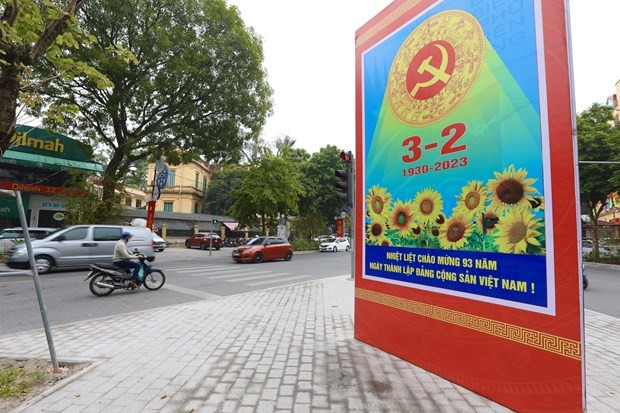
Communist Party of Vietnam - leader, companion of nation
Latest
 |
| Under the leadership of the Communist Party of Vietnam (CPV), the revolutionary cause of Vietnamese people has gained successes of historical and epochal significance. |
On February 3, 1930, nearly 20 years after leaving the country to seek ways for national salvation, Nguyen Ai Quoc (later known as President Ho Chi Minh) chaired a conference to merge three communist organisations in Vietnam into the Communist Party of Vietnam (CPV), marking an important milestone in the country’s history of national construction and defence.
The event was a turning point for the country, ending a crisis in orientations for national salvation and leadership of the patriotic movement of Vietnam in the early 20th century. The moment also became the starting point for the victory of Vietnamese revolution and the growth of the nation in the following periods.
With sound policies, the CPV strongly inspired and revived aspirations for national liberation among the Vietnamese people. Only 15 years following the Party revolutionary path, Vietnam had made a great miracle – the success of the August Revolution in 1945, smashing the colonial-feudal rule, establishing the Democratic Republic of Vietnam, and bringing the nation into the era of independence and freedom.
On September 2, 1945, at the Ba Dinh Square in Hanoi, President Ho Chi Minh read the Declaration of Independence, giving birth to the Democratic Republic of Vietnam. A new era opened for the nation, the most glorious era in the national history – the Ho Chi Minh era.
Thirty years later, with the 1975 Spring General Offensive and Uprising, with its peak being the historical Ho Chi Minh Campaign, under the leadership of the Party, the military and people of Vietnam ended their century-long fight against the French colonialists and the American imperialists, reunifying the nation, and opening an era of national independence, unity and socialism.
The success of the two long-term resistance wars against the French colonialists and the American imperialists was the combined result of a series of factors that created the invincible strength of the Vietnamese revolution. But the origin of these factors is the wise leadership of the Party - the vanguard force of the Vietnamese working class.
Following the national reunification, the country entered a period of socialism building with numerous challenges and difficulties from both the inside and outside.
In this context, the Party once again showed its responsibility before the nation and history by launching and leading the “Doi Moi” (Renewal) cause, which started from the sixth Party Congress in 1986.
Accordingly, the Party decided to implement a constant and long-term policy of developing a multi-sector economy, while renewing social policies, focusing on solutions to improve people's living conditions in all aspects.
After 35 years of renewal, Vietnam has recorded great achievements of historical significance, with the most outstanding one being economic growth. The country has escaped from the status of a poor and underdeveloped country, and joined the middle-income group since 2008. Per capita income topped 4,000 USD in 2022. In the year, the country’s GDP growth hit 8.02%, the highest level in the 2011-2022 period. Many other records were also set, including import-export turnover of over 700 billion USD, trade surplus of 11.2 billion USD, making 2022 the seventh consecutive year that Vietnam had enjoyed a trade surplus.
Sustainably settling food security, Vietnam is currently one of the leading rice exporters, while Vietnamese farm produce has now entered more choosy markets. The national economy is now strongly integrated into the region and the world. The country has established trade partnerships with more than 200 countries and territories, and signed bilateral trade deals with more than 100 countries, including many new-generation agreements.
At the same time, the country’s foreign relations have been increasingly expanding and deepening. Vietnam's position and reputation in the international arena have been enhanced. To date, the country has established diplomatic relations with 191 out of 193 UN member states, along with strategic partnerships and comprehensive partnerships with more than 30 countries, including all major countries in the Asia-Pacific region and the five permanent members of the United Nations Security Council.
Multilaterally, the country has been an active and responsible member of more than 70 important international organisations and forums such as the United Nations (UN), Association of Southeast Asian Nations (ASEAN), Asia-Pacific Economic Cooperation (APEC) forum, the Asia-Europe Meeting (ASEM), and the World Trade Organisation (WTO).
Vietnam has successfully organised many large-scale international events and completed many important international tasks as a non-permanent member of the UN Security Council, the ASEAN Chair, the host of the ASEM Summit and APEC Economic Leaders’ Meeting and the World Economic Forum on ASEAN.
Under the leadership of the CPV, the revolutionary cause of Vietnamese people has gained successes of historical and epochal significance, changing the lives of every Vietnamese and the destiny of the entire nation. Living conditions have constantly improved, while the country’s achievements in socio-economic development have been recognised and applauded by the international community, along with expanded international integration and strengthened economic, trade and investment partnership. These attainments have created an important foundation for the country to continue to renovate itself and thrive, confidently heading to the future.













